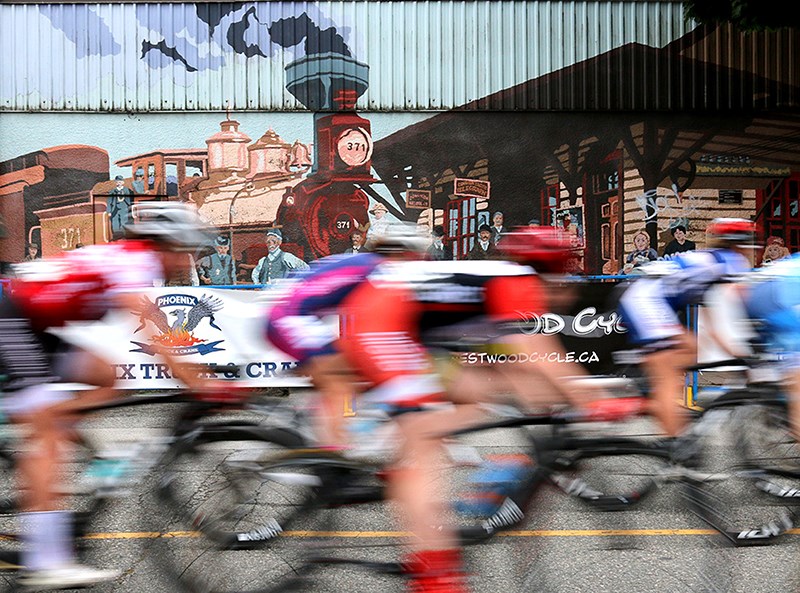The first-ever PoCo Grand Prix may have cost more than planned to stage but it also raised more money than anticipated.
According to a report to Port Coquitlam city council Monday, the pro bike race cost $223,000 to stage but about $74,000 in unanticipated revenue meant the net cost to the city was nearly bang on the budgeted $85,000.
BC Superweek organizers and the city had expected costs to be in the $150,000 range — including the $15,000 purse for the winning rider — but the actual tally was $223,260 for such bills as labour, supplies and marketing, a difference of $73,260.
Still, donations, sponsorships and race rider and corporate race fees offset the total by a whopping $138,950 — $74,000 more than organizers anticipated.
Mayor Greg Moore, who took part in the corporate team ride, said next year’s race won’t have the big charges, with the budget scaled back by $8,000.
And because of the buzz it created in the community and around the region, Moore said it’s likely to draw even more sponsorship over the next four years. (The Tri-City News was a sponsor.)
Still, Coun. Dean Washington took aim at the amount of city staff time involved to host the PoCo Grand Prix.
PoCo’s area recreation manager Glenn Mitzel, who spoke for the race organizing committee, said exempt and salaried staff from the parks and recreation and communications departments worked about 1,000 hours on the project — equal to about $70,000 (including benefits) not charged to the event.
As well, there were 881 staff hours involved in hosting the PoCo Grand Prix, at a cost of $33,200 (including benefits), also not charged.
By comparison, city staff time totalled $4,700 to host May Day this year (about 10% to 12% of the overall budget), said Lori Bowie, PoCo’s rec director.
“I love events. I cheer them on. But I have real problems with spending this,” Washington said of the PoCo Grand Prix numbers. “I know there’s a lot to put on events but that’s a heck of a lot.”
Washington, who ran this year’s Downtown PoCo Car Show, said his organizing committee would have been charged had city staff resources been used for his August car display, which drew at least five times more visitors to the core.
And he doubted if the PoCo Grand Prix committee could be self-sustaining — as promised — given the amount of city staff involvement over the past year.
Moore argued the new event generated more enthusiasm as it got closer and, a result, employee expenses rose “to create a good first impression.”
The mayor also noted the main sponsor, Dominion Lending Centres, has signed on for the remaining four years, thus reducing costs such as marketing and printing. He expects other revenues to rise — and even double — as the event expands.
Coun. Darrell Penner said while he, too, was unhappy with the amount of staff time, the community benefitted, and the race spread the message about healthy living.
Mark Ernsting, principal of M1 Sports Management, which earned a $15,700 fee to stickhandle the PoCo Grand Prix, told council Monday he received positive feedback from riders.
“They really enjoyed the course structure and design,” he said, adding Cycling Canada was pleased with the event roll-out in its first year.
PoCo’s chief administrative officer, John Leeburn, said the city is learning its lessons to plan for the 2017 race, including better accommodation for downtown retailers whose businesses were affected by the course. Among the suggestions to be considered by the organizing committee are:
• changing the race to a weekend day;
• starting the event later in the day;
• moving the course to keep Shaughnessy Street open north of McAllister;
• and creating a Downtown Business Engagement sub-committee.
Susanna Walden, executive director of the Downtown PoCo Business Improvement Association, spoke to city council in camera this week about her members’ survey. Those results will be disclosed in next month’s BIA newsletter.
Today (Thursday), Walden told The Tri-City News that of the 201 surveys distributed, 60 were returned and indicated, overall, “businesses are very excited about the PoCo Grand Prix and are in favour of hosting events and festivals.”
Still, “the Friday [race day] posed challenges to host an event like that. Having barricades up — unlike the car show — creates a different feel and there are some mobility issues but, of course, they’re needed for safety reasons.”
Walden said the BIA also wants downtown property and business owners to make the most of the PoCo Grand Prix with better exposure and marketing.
jwarren@tricitynews.com
@jcleughTC
•••••
What is BC Superweek?
North America's most prominent professional road cycling series features eight races over 10 days, starting the second week of July.
The series consists of Tour de Delta, Global Relay Gastown Grand Prix, Giro di Burnaby, Tour de White Rock and PoCo Grand Prix (a replacement of the UBC Grand Prix).
Riders race for more than $120,000 in cash prizes.
Eight-time U.S. national champion Justin Williams, riding for Cylance/Incycle p/b Cannondale, clinched the inaugural PoCo Grand Prix (men's pro 1/2 division), taking the $15,000 purse after finishing the 1.3-km criterium-style route.
Kendelle Hodges, an independent cyclist from Melbourne, won the women's pro 1/2/3 category at the PoCo Grand Prix.
Visit bcsuperweek.ca.



